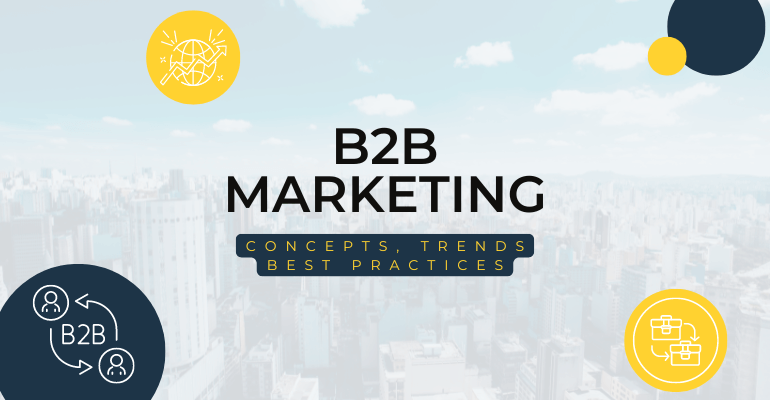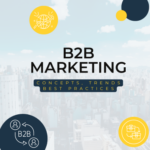B2B Marketing, or Business-to-Business Marketing, involves strategies where businesses market their products or services to other companies rather than individual consumers. It plays a crucial role in today’s business landscape by helping companies build long-term relationships, drive revenue growth, and maintain competitive advantages.
This article explores the core concepts, key strategies, trends, and tools that define effective B2B marketing strategies and the best practices. It also aims to provide actionable insights that can enhance your company’s marketing efforts.
At The Zulfis, we understand the complexities of B2B marketing and provide tailored strategies to help your business build meaningful relationships with other companies.
What is B2B Marketing?
Business-to-Business (B2B) Marketing refers to the strategies and techniques used by companies to promote their products or services to other businesses rather than to individual consumers. Unlike B2C Marketing, which focuses on appealing to broad consumer audiences (B2C customers) in B2C companies, B2B business marketing targets decision-makers within companies, such as procurement teams or business owners. This form of marketing emphasizes building long-term relationships, as B2B buyers often seek reliable, long-term solutions that can support their company's revenue growth and operational needs. Developing trust through educational content and personalized engagement is crucial for success in B2B markets.
Differences Between B2B and B2C Marketing
Before moving forward, first we need to clarify the difference between B2B and B2C.
- Target Audience: B2B focuses on professionals and organizations, while B2C targets individual consumers, and usually focuses on consumer marketing.
- Buying Process: B2B involves a more complex, long-term buying process with multiple stakeholders, often requiring more detailed and informative content to assist in decision-making.
- Relationship Building: Business to Business marketing prioritizes long-term relationships and account-based marketing, fostering connections that can result in sustained business partnerships. Conversely, B2C marketing often aims for quick, emotional connections that drive immediate purchases.
Importance of Building Long-Term Business Relationships
In B2B marketing, building long-term relationships with clients is vital. These relationships are built on trust, consistent value delivery, and personalized engagement strategies. By focusing on long-term partnerships, B2B companies can ensure happy customers who are more likely to become repeat buyers and advocates for the brand, driving sustained revenue growth and success.
History and Evolution of B2B Marketing
B2B, or Business to Business marketing, has undergone significant transformation over the years. Initially, it was about establishing long-term relationships with other businesses through personal interactions and direct sales. With the evolution of technology, the landscape has shifted dramatically. Today, B2B marketing leverages advanced digital marketing strategies and tools that allow businesses to reach their target market more efficiently and effectively. Understanding this evolution helps marketers appreciate the journey and adapt to current trends.
Early Forms of B2B Marketing
B2B marketing, or Business to Business marketing, has roots in traditional commerce where businesses engaged in trade with other businesses rather than individual consumers. Early B2B marketing strategies focused on building long-term relationships with B2B buyers through direct sales, networking, and trade shows. These interactions were highly personalized, relying on face-to-face communication and manual processes to meet the specific needs of potential customers, which is important for building B2B relationships.
Evolution Through the Digital Age
The digital revolution transformed B2B marketing by introducing digital channels such as email marketing and social media platforms. This shift allowed B2B companies to reach a broader target audience more efficiently. The rise of account-based marketing and search engine optimization further refined targeting methods, enabling businesses to connect with ideal customers through tailored B2B marketing techniques. As technology advanced, so did the complexity of the buying process, with B2B buyers now relying heavily on educational content and online research before making a purchase decision.
Key Milestones in B2B Marketing Development
Several milestones marked the growth of B2B marketing, including the introduction of digital marketing strategies and the integration of social media marketing. The development of CRM systems allowed sales teams to manage relationships more effectively, while the shift towards B2B content marketing empowered businesses to influence the B2B buyer decision process. These advancements contributed to significant revenue growth and have solidified B2B marketing's role in driving long-term solutions for B2B businesses.
Types of B2B Marketing
In B2B marketing, businesses leverage various strategies to connect with potential buyers and customers. These approaches differ significantly from B2C marketing, requiring a focus on building long-term relationships and targeting decision-makers within organizations. Here’s an overview of the primary types of B2B marketing:
1. Direct Marketing
Direct marketing in B2B involves personalized outreach efforts such as cold calling, direct mail, and targeted email campaigns. These tactics are designed to engage potential customers directly, aiming for immediate responses, and customer profiles are researched beforehand.
For B2B companies, direct marketing offers a way to reach specific business buyers in the B2B market, often with tailored offers that address their unique needs. This approach is particularly effective for sales teams seeking to build long-term relationships and secure steady revenue growth.
To master list building, visit our blog on Expert B2B List Building Services to Propel Your Business Growth.
2.Inbound Marketing
Inbound marketing attracts potential customers by creating valuable, educational content that resonates with their needs. This strategy includes search engine optimization (SEO), blogging, and content marketing. By optimizing for search engines, B2B businesses can ensure their content reaches the right audience at the right time. Inbound techniques are ideal for nurturing potential buyers through the buying process, turning them into loyal B2B customers.
3.Account-Based Marketing (ABM)
Account-Based Marketing (ABM) is a highly targeted strategy where marketing teams focus on specific accounts or companies rather than a broader audience. ABM aligns closely with sales efforts, creating personalized marketing campaigns for individual consumers within target organizations. This approach is particularly effective in B2B settings where long-term solutions and strong relationships with key accounts are critical for success.
4.Event Marketing
Event marketing involves organizing or participating in trade shows, webinars, and conferences to engage with B2B buyers. These events offer opportunities for face-to-face interactions, allowing businesses to showcase their solutions, build brand awareness, and foster long-term relationships. Event marketing can be an essential part of a broader B2B strategy, helping companies to reach their ideal customers and influence their purchase decisions.
5.Email Marketing
Email marketing in B2B focuses on segmentation and automation to deliver personalized content to specific audience segments. This strategy is effective for nurturing leads, maintaining communication with potential buyers, and driving engagement through regular updates and offers. By automating email campaigns, businesses can efficiently manage large lists of B2B customers and tailor messages to meet the unique needs of different buyer personas.
These diverse B2B marketing techniques, when combined with a solid digital marketing strategy, can help businesses effectively reach their target audience, build strong relationships, and drive long-term growth.
Key Strategies in B2B Marketing
In the dynamic world of B2B marketing, effective strategies are crucial for reaching and engaging with your target audience. Businesses must navigate a complex landscape to attract potential customers and build long-term relationships that drive revenue growth. Here, we explore key B2B marketing strategies, focusing on content marketing, LinkedIn B2B marketing, data-driven targeting, social media strategies, and brand positioning.
Content Marketing for B2B
Content marketing is a cornerstone of B2B strategy, offering long-term solutions for nurturing business relationships and guiding potential buyers through the B2B buyer journey.
- Types of Content: Effective B2B content marketing includes whitepapers, case studies, and educational content tailored to the needs of business buyers. These materials provide valuable insights, helping B2B customers make informed decisions during the buying process.
- Distribution Channels: Leveraging various digital channels like email marketing, social media platforms, and search engines ensures your content reaches your ideal customers. A robust search engine optimization strategy can enhance visibility, attracting a broader business audience.
LinkedIn B2B Marketing
LinkedIn is a powerful platform for B2B marketing, offering several tools to engage with B2B buyers and decision-makers.
- Maximizing Sales with SalesQL: Integrate SalesQL with LinkedIn to enhance your lead generation efforts, targeting B2B companies effectively.
- LinkedIn Premium Benefits: Utilize advanced features like InMail credits and analytics to reach your target audience, improving your marketing campaigns.
- Effective LinkedIn B2B Marketing Strategies: Focus on content sharing, networking, and leveraging LinkedIn Groups for account-based marketing to connect with potential customers.
- What Does 1st Mean on LinkedIn?: Understand the importance of 1st-degree connections in building relationships and driving B2B marketing success.
- The Role of LinkedIn in Lead Generation: Use LinkedIn's lead generation tools to capture business buyers and integrate these efforts with CRM systems for better tracking.
Data-Driven Targeting
Data-driven targeting is essential for creating personalized marketing campaigns that resonate with your target market.
Using Data for Targeted Campaigns: Leverage data analytics to identify and target B2B customers more precisely, ensuring your message reaches the right audience at the right time. By focusing on buyer personas and understanding the B2B buyer decision process, marketing teams can create more effective and personalized content.
Social Media Strategies
Social media channels are vital in modern B2B marketing, offering platforms for both engagement and promotion.
LinkedIn, and Twitter for B2B: Utilize these social media platform content with B2B buyers. Social media marketing campaigns on these platforms can amplify your reach, fostering long-term relationships with potential buyers.
Establishing Brand Positioning
Strong brand positioning differentiates your company in the competitive B2B market.
Differentiation in the Market: Position your brand by highlighting unique value propositions that address the specific needs of your target audience. Effective brand positioning not only attracts potential customers but also builds trust and loyalty, turning them into happy customers over time. Establishing your brand as a thought leader through consistent messaging and educational content can further enhance your market position.
Incorporating these strategies into your B2B marketing efforts will help you connect with your target audience, build long-term relationships, and drive sustained revenue growth.
Current Trends in B2B Marketing
B2B marketing is embracing several key trends that are reshaping how B2B businesses connect with their target audience and achieve long-term growth.
Rise of Account-Based Marketing (ABM)
ABM continues to gain traction as B2B companies prioritize quality over quantity, focusing on targeted, personalized marketing campaigns aimed at specific accounts. This shift emphasizes long-term relationships and tailored strategies to engage potential customers deeply.
Personalization and AI
AI-driven personalization is transforming B2B strategy by enabling marketing teams to deliver highly relevant content. This approach aligns with the increasing demand for individualized experiences, enhancing the buying process for B2B buyers and fostering stronger connections with potential buyers.
Growth of Video Marketing
Video content is becoming a vital tool in B2B content marketing, helping businesses engage B2B customers effectively. Educational content, product demonstrations, and testimonials via video are enhancing B2B buyer journeys, driving higher engagement on social media platforms.
Sustainability and Ethical Marketing
Sustainability is no longer just a buzzword; it's a critical factor influencing purchase decisions. B2B companies are integrating ethical practices into their marketing techniques, appealing to a target market that values long-term solutions and corporate responsibility.
Integration of Marketing Tools
The integration of various marketing tools is essential for creating cohesive digital marketing strategies. B2B businesses are leveraging CRM systems, email marketing platforms, and social media channels to streamline marketing campaigns, enhance ROI, and ensure that marketing efforts resonate with their business audience. This unified approach helps maintain consistency across digital channels, supporting the long-term growth of loyal customers.
By staying ahead of these trends, B2B marketers can refine their strategies, address the unique needs of B2B buyers, and secure a competitive edge in an increasingly digital marketplace.
Challenges in B2B Marketing
Navigating the evolving landscape of B2B marketing presents numerous challenges for B2B companies. One of the foremost difficulties is navigating changing buyer expectations. Today’s B2B buyers are more informed and expect personalized experiences. Understanding the B2B buyer journey is crucial for delivering targeted marketing campaigns that resonate with potential customers.
Another challenge is aligning sales and marketing teams. In B2B businesses, ensuring that both teams work cohesively is essential for nurturing leads and driving revenue growth. By focusing on account-based marketing and creating unified buyer personas, B2B companies can streamline efforts and improve efficiency.
Measuring ROI effectively is also a significant hurdle. With the variety of digital channels available, tracking the impact of B2B marketing techniques requires robust analytics and an understanding of the buying process. This helps in refining marketing strategies and justifying marketing spend.
Finally, adapting to technological changes is vital in the rapidly evolving B2B marketing landscape. From leveraging new social media platforms to incorporating search engine optimization and automation tools, staying ahead of technological trends is key to maintaining a competitive edge. For marketing teams, embracing these changes ensures they can meet the demands of the modern business audience and secure long-term solutions for B2B customers.
Case Studies in B2B Marketing
Understanding the real-world applications of B2B marketing strategies is essential for any business aiming to thrive in today’s competitive landscape. By examining successful case studies, we can uncover practical insights and proven techniques that have driven significant results for B2B companies. These examples highlight how various marketing strategies—ranging from content marketing to CRM tool integration—have effectively targeted B2B buyers, leading to sustained revenue growth and long-term relationships with loyal customers.
Case Study 1: Content Marketing Excellence
One of the most effective B2B content marketing strategies was demonstrated by HubSpot. By providing valuable educational content tailored to their target audience, HubSpot built a strong brand presence and attracted potential buyers to their platform. Their inbound marketing efforts, including blogs, eBooks, and webinars, significantly boosted their lead generation and conversion rates. This case highlights how creating relevant, informative content can engage B2B buyers throughout the buyer journey.
Case Study 2: LinkedIn Marketing Success
LinkedIn is a powerful platform for B2B businesses looking to connect with potential customers. Cognizant, a leading IT services company, utilized LinkedIn to execute a highly targeted account-based marketing campaign. By leveraging LinkedIn's advanced targeting options, they reached decision-makers in their ideal customer profiles, resulting in a 30% increase in lead generation and a significant boost in brand awareness among B2B buyers.
Case Study 3: Inbound Lead Generation Success
Salesforce executed a successful inbound lead generation campaign by focusing on personalized content that resonated with specific B2B buyer personas. Through targeted email marketing and SEO-optimized content, Salesforce was able to nurture leads through the buying process, resulting in a 25% increase in qualified leads. Their strategy emphasizes the importance of understanding the target market and creating content that addresses the unique challenges of B2B customers.
Case Study 4: Successful Email Marketing Campaigns
Marketo implemented an effective email marketing strategy that combined segmentation and personalized messaging to engage its target audience. By using advanced email deliverability tools and analytics, Marketo optimized its campaigns, achieving higher open rates and conversion rates. This case demonstrates how tailored email campaigns can drive engagement and foster long-term relationships with B2B customers.
Case Study 5: Effective Use of CRM Tools
IBM revolutionized their sales team’s approach by integrating advanced CRM tools, such as Salesforce, to streamline their sales process and better manage customer relationships. This integration allowed IBM to track customer interactions, predict purchase decisions, and personalize their marketing efforts, leading to a 40% increase in customer retention. This case study highlights the crucial role CRM systems play in enhancing B2B marketing techniques and supporting long-term solutions.
These case studies demonstrate how strategic B2B marketing campaigns, backed by data-driven insights and effective tools, can lead to substantial business growth and stronger connections with B2B customers.
Tools and Resources for B2B Marketers
To succeed in B2B marketing, it’s essential to leverage the right tools and resources. These tools help streamline processes, improve efficiency, and ultimately drive revenue growth by connecting with your ideal customers.
At The Zulfis, we leverage advanced CRM systems, marketing automation tools, and analytics platforms to enhance your B2B marketing efforts, ensuring you achieve your business objectives efficiently.
CRM Systems
Customer Relationship Management (CRM) systems like Salesforce and HubSpot are crucial for managing interactions with B2B customers. These platforms help sales teams track customer journeys, manage leads, and maintain long-term relationships. They are vital for understanding the B2B buyer journey and ensuring that marketing efforts are aligned with business objectives.
Marketing Automation Tools
Marketing automation tools like Marketo and Pardot enable marketing teams to automate repetitive tasks such as email marketing campaigns, social media posts, and lead nurturing. These tools help create personalized marketing experiences, ensuring that potential buyers are engaged at every stage of the buying process.
Analytics Tools
Analytics tools like Google Analytics and SEMrush provide insights into the effectiveness of your digital marketing strategy. By analyzing data from search engines and social media platforms, these tools help you understand your target market's behavior and refine your B2B marketing techniques to better reach your business audience.
Content Management Systems (CMS)
Content Management Systems like WordPress and HubSpot are essential for creating and managing educational content that resonates with B2B buyers. These platforms support search engine optimization (SEO) efforts, making it easier for potential customers to find your content through search engines.
Email Marketing Platforms
Email marketing remains a powerful tool for B2B businesses. Platforms like MailChimp and Constant Contact offer features that allow businesses to segment their email lists, automate campaigns, and track engagement. These tools are crucial for nurturing leads and converting potential customers into loyal customers.
These tools are indispensable for any B2B strategy, ensuring that your marketing efforts are not only efficient but also highly effective in reaching and engaging your target audience .
Wrapping Up
B2B Marketing is essential for building sustainable business relationships and driving long-term growth. By leveraging key strategies such as content marketing, data-driven targeting, and personalized outreach through platforms like LinkedIn, businesses can effectively engage B2B buyers and decision-makers.
As technology evolves, staying ahead of trends like account-based marketing, AI, and video marketing will be critical. Adopting best practices and utilizing the right tools will ensure your marketing efforts are not only effective but also adaptable to future challenges. To explore more strategies and tools, visit The Zulfis Blog.



